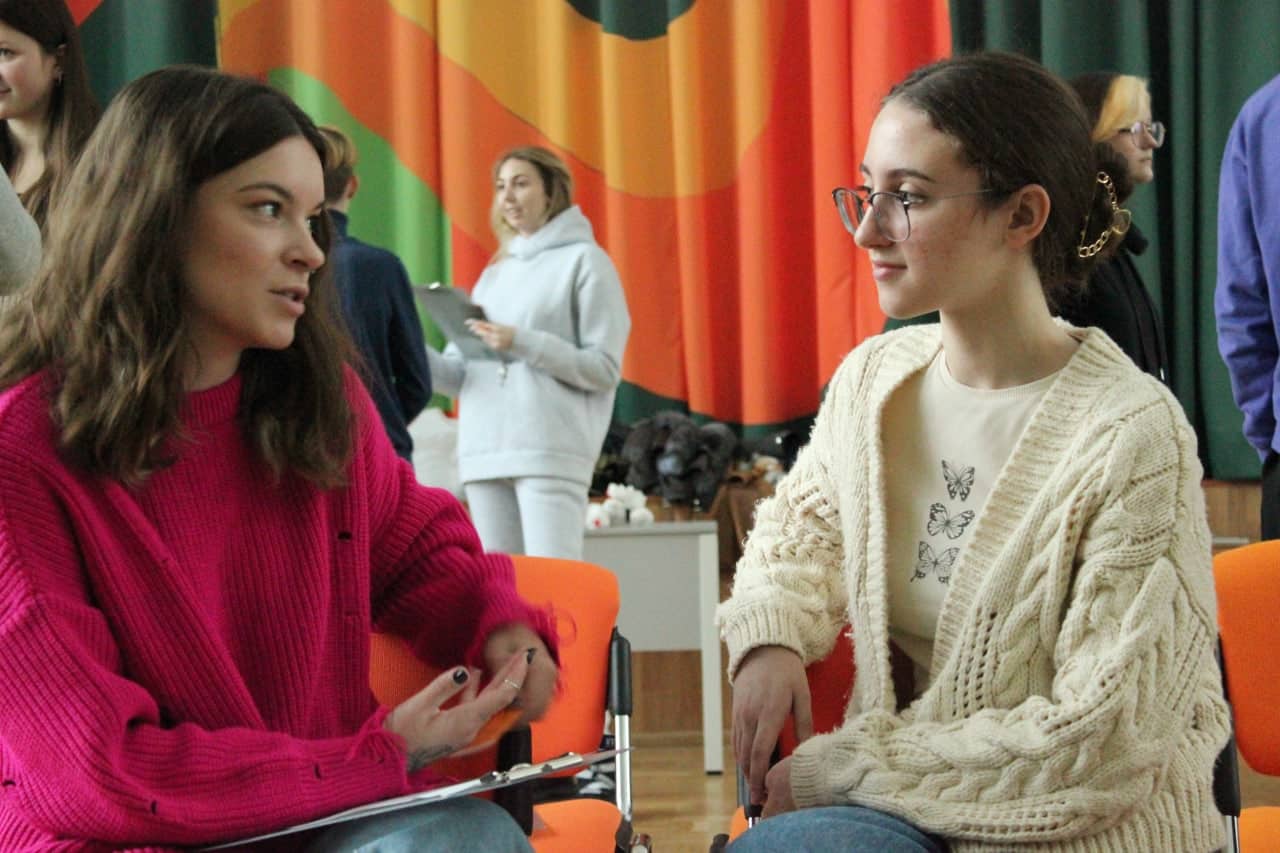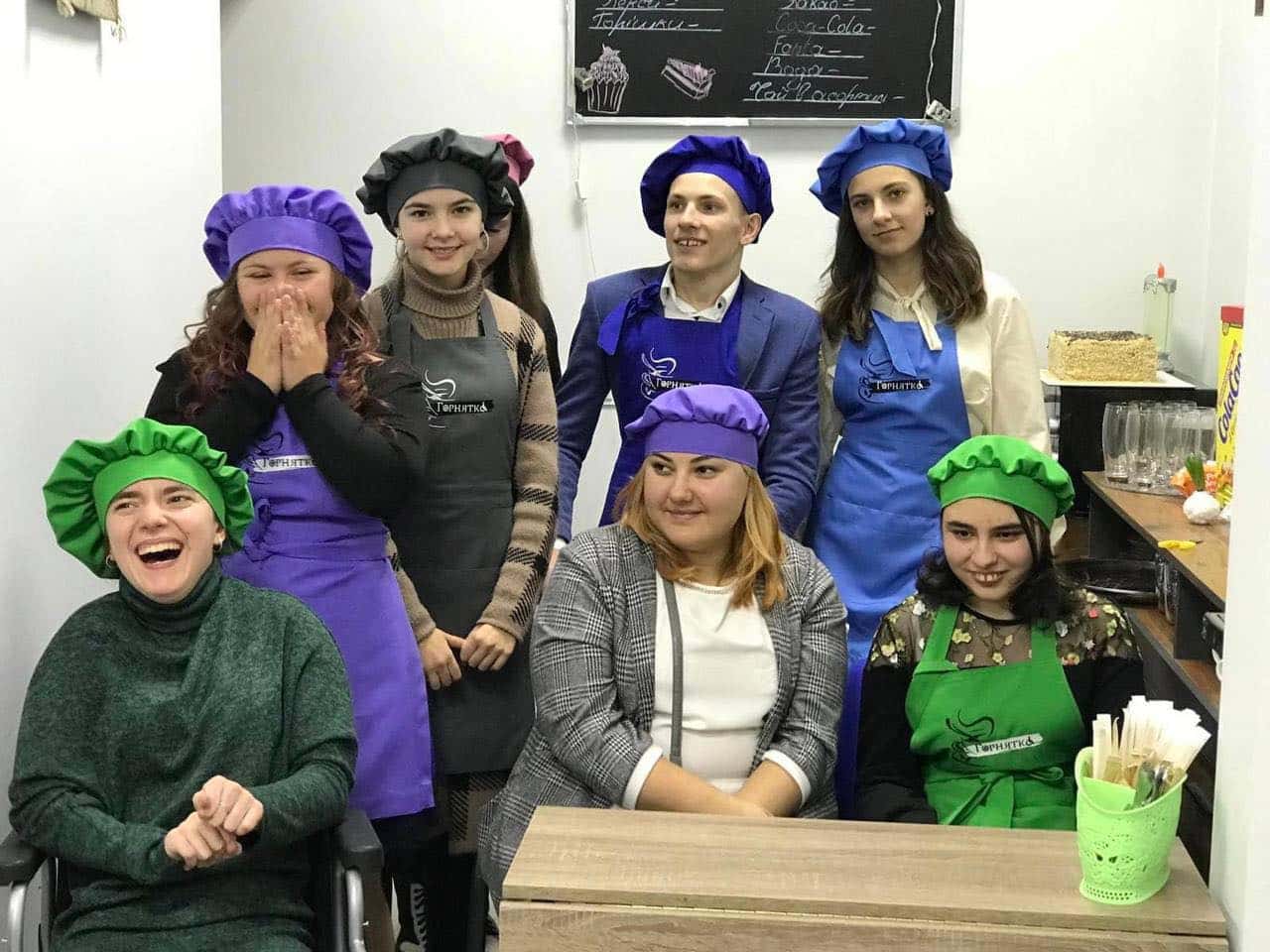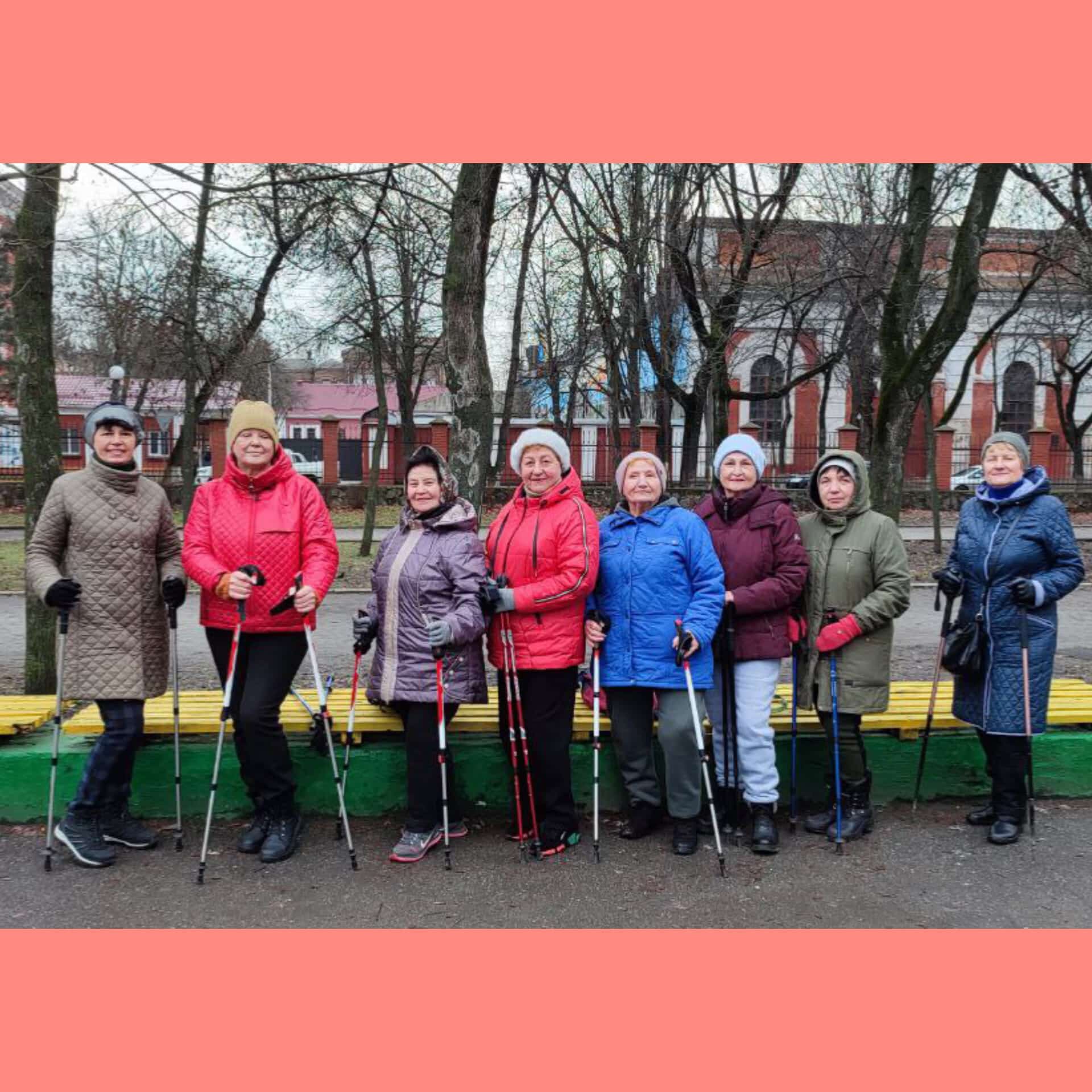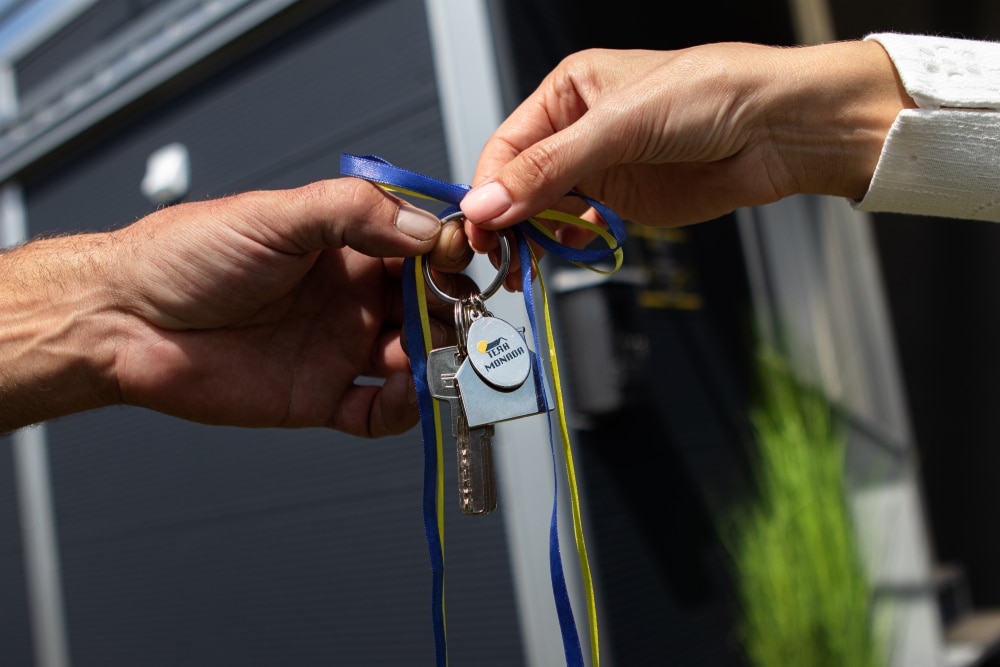A journalist of the Media of Great Stories has visited the School of Heroes, having talked in front of its audience and become a mentor for a young would-be journalist. In this piece she writes about how things run at the school firsthand, about what it means for children and how everyone can become a part of something important.
Requirements for participation
I learned about the School of Heroes by chance from a friend of mine, who spoke about the profession of a programmer to its students. Back then I knew nothing about the project, but I was struck by its concept. Once a week students from different schools get together at a specific location to listen to speakers from different areas. Children can talk to those experts who inspire them and who potentially can become their mentors, learning more about their profession.
I decided to apply as a speaker and talk about the world of journalism and writing. This was not a difficult task as I wrote to the initiator of the project, Andriy Pushkar. There were no requirements I had to meet. I was not supposed to hand in a presentation or prepared speech. All I had to do was to come to the meeting in a good mood and thirst for a conversation. Nevertheless, I ordered three books on writing with the aim of presenting them to the kids whose eyes would light up, willing to learn more.
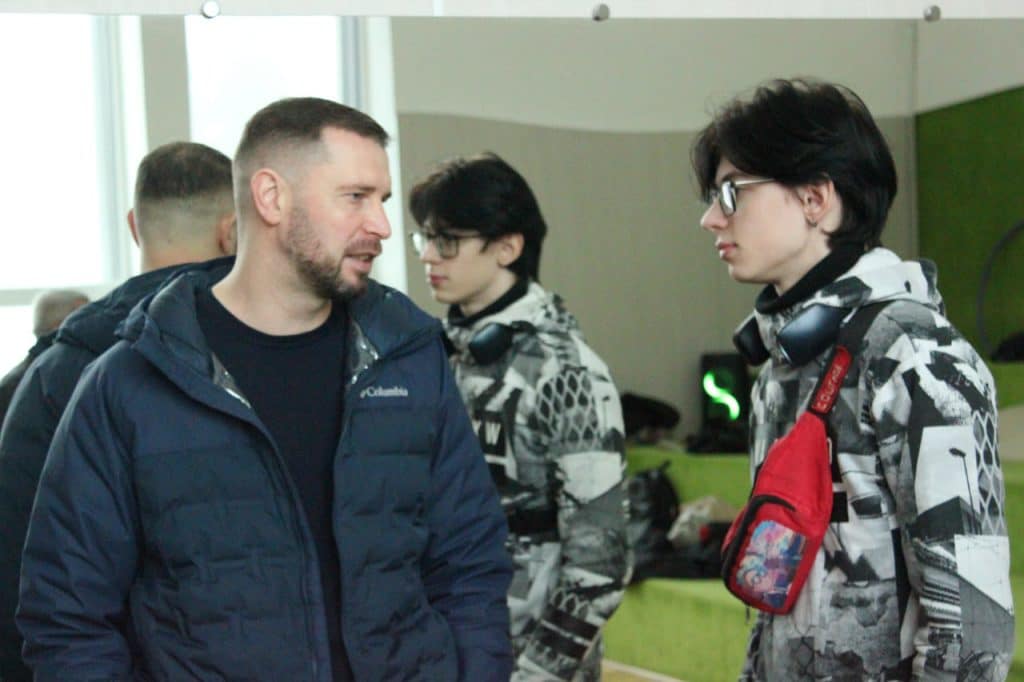
Prior to the event the information about future speakers is published on a particular webpage. Children may check the announcement and prepare questions for a particular speaker or for all of them. I used the opportunity to learn in whose company I would be speaking on that day. It turned out these were a music producer, Roman Semenchuk, chairman of the board of the International League for protection of the rights of Ukrainian citizens, Eduard Bahirov, head of the technical infrastructure department of YUMAS, Vadym Triukhan, a psychologist, Hanna Lytvynchuk, and another three experts. All these people come from different sectors, but that is exactly the point.
Contacts, practice and money
As soon as I arrived at the school where the meeting was to be held, I got acquainted with Hanna, the psychologist, straight away. She was to speak in front of the school’s audience for the first time. She was longing to tell them about psychology and possibly encourage some of the students to consider the option of acquiring the profession. I came to the meeting with similar intentions.
There was a fair around us where children were selling (well, actually to the speakers) things they made by hand: tea, cookies, mud pies, trench candles, knitted socks, toys and photos taken by themselves. They would spend all the proceeds on developing their projects or pushing their dreams. Now these proceeds are donated to the Armed Forces of Ukraine (hereinafter: AFU).
I immediately took notice of a girl wearing a military uniform with the Ukrainian flag on her shoulders. I then learned that she and her parents make trench candles. Some of them are sent to the front, while part of the proceeds received at such fairs go to the AFU. The girl took much interest in warfare, aiming to become a volunteer. She is in the 9th grade. I bought a candle from her to support her and our army at the same time.
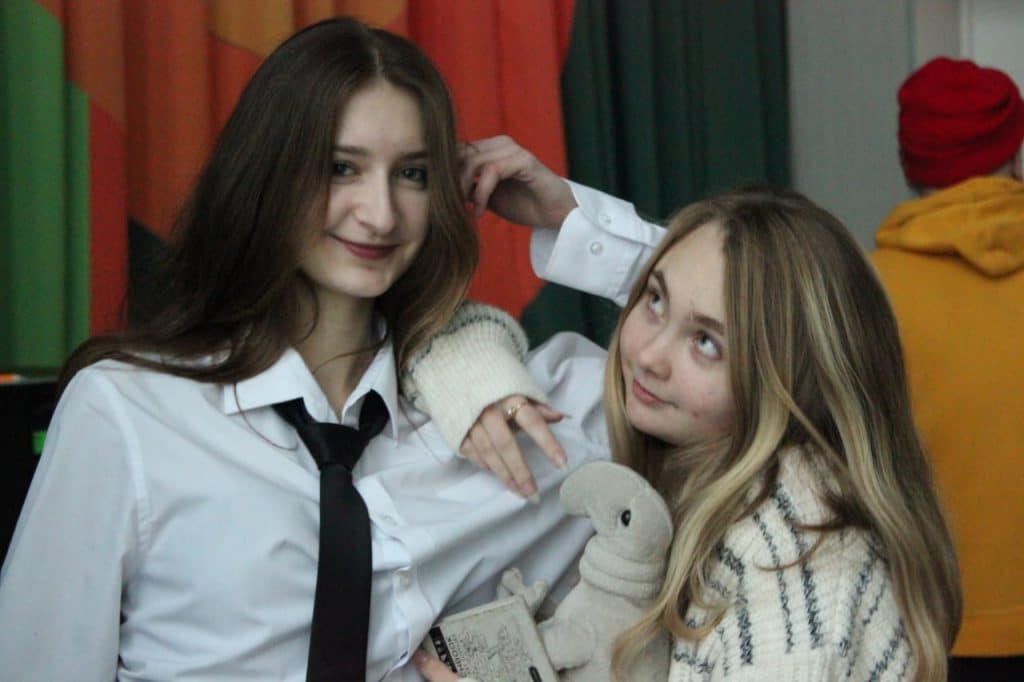
There were other two girls selling mud pies and profiteroles at their stands. They both dreamed of launching their confectionaries, while raising money, collecting information and contacts that would bring them closer to their dreams. I bought yummy custard-filled cakes from them.
A boy at the fair seemed to be its most active participant, though. He got acquainted with all of the speakers, telling jokes louder than anyone else, cutting quite a relaxed and laid-back figure, passionately showing others the herbal tea he was selling. He was doing all this to achieve his biggest dream – the first ants museum in the world. Sure enough, his soothing tea bags also ended up in my bag.
‚That’s how kids learn how to sell. The School of Heroes places on value on three things: contacts, practice and money. At such fairs children sell things they get to practice making at home. They also make some money. And they get new contacts while conversing with speakers directly’, says Andriy Pushkar.
‚Every human has got a talent‘
Then everything went perfectly as planned. Kids would step forward, having 60 seconds to introduce themselves, speak about their dreams, interests and goals. Speakers would take notes, pointing out the children they found interesting and those who impressed them the most. Some of the children were up for traffic arbitrage, cryptocurrencies, finance, programming, while others liked to play music instruments or write music. Some kids were into handmade things or pastry, and some did now know what they want to do in the future.
There were 5 female students who enjoyed writing and saw their future in journalism. I immediately took down their names. Afterwards, speakers introduced themselves and the field in which they were active. When my turn came, I saw the eyes of 5 girls light up.
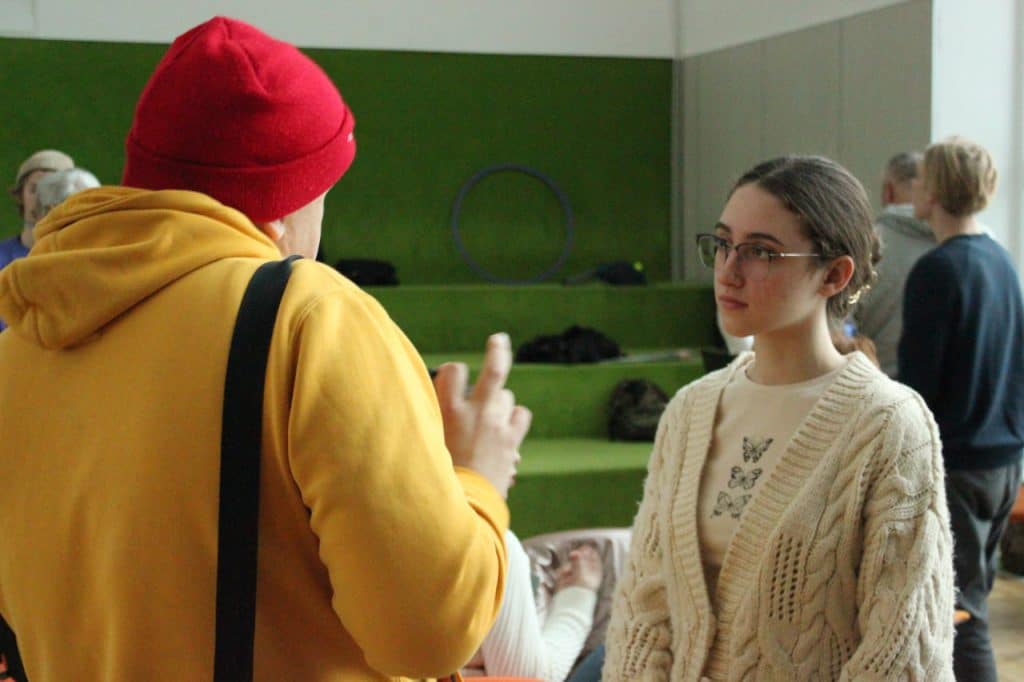
At Andriy’s signal, the kids sprang to their feet and dashed off to talk to the speakers in a conversation with whom they were interested. I was immediately surrounded by the girls. Masha was the nimblest of them all. She reminded me of myself when I was her age. Masha is 16. She is a migrant from Donetsk. She writes poems and wants to pursue her vocation in journalism. She is even one of the news anchors at school. I had to recollect so many things, dates and stories while answering the girls’ questions. However, Masha’s thirst for knowing more was insatiable.
My next interlocutor was Aria. She did not know yet which path exactly she would want to choose, that of a journalist or a photojournalist. She said the thing that led her to ponder this question was a professional camera that Aria received as a gift from one of the previous speakers. Ever since that day Aria has literally been taking pictures of everything she spots around her. At her stand visitors were able to see her photos.
Leyla gently sat next to me and first inquired about my mood and health. She then began asking questions. This move endeared her to me.
She appeared a calm and polite girl, able to articulate questions and her stories. She intuitively understood at what point it would be wise of her to let other girls speak. That is what I call a ticket straight to journalism.
A little girl named Eva was possibly the youngest of the lot. She is in the 8th grade. She is so small and fragile that it seems she attends a primary school. She belongs to the category of kids who have not made up their mind yet about where they see themselves. However, she already managed to get her own stand at the fair where she was selling homemade cookies. While I was explaining to her why writing and telling stories is great fun, Eva seemed jittery. She was even trembling. It was obvious it was a huge effort on her part to come up to speakers and strike up a conversation with them. I was trying to calm her down and said she was so brave to speak to me. These words embarrassed her even more. Another girl did not manage to speak to me but she was insisting on my taking a look at her woven toys.
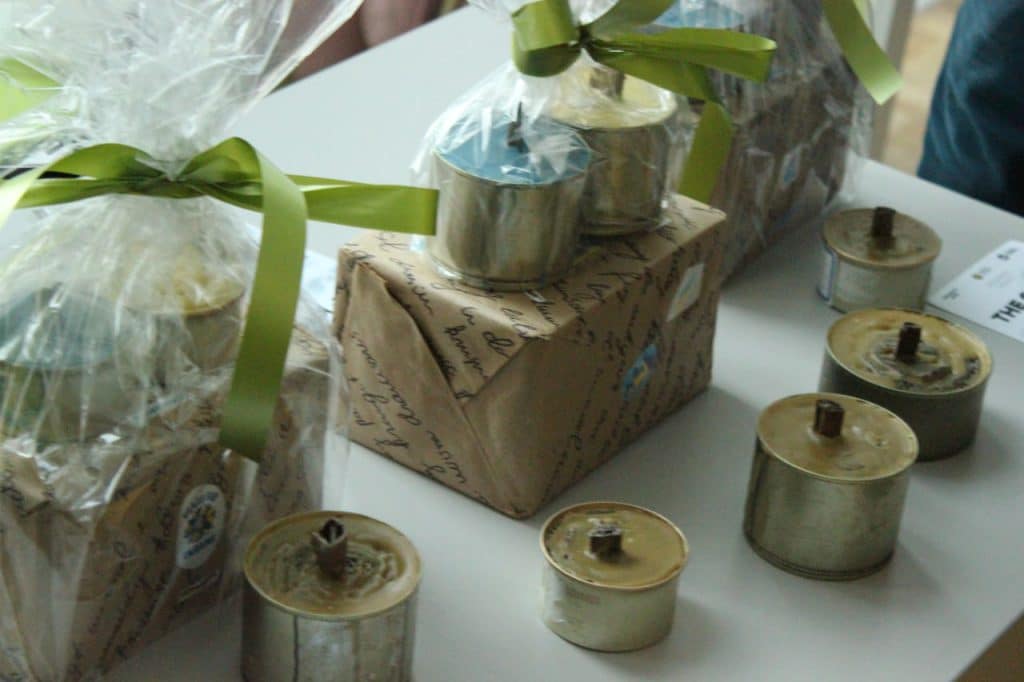
The Q&A session drew to its end. I was quite satisfied with the interaction, albeit a bit weary and impressed by how enthusiastic the girls were to whom I spoke. I presented Masha, Leyla and Aria with books on writing. I hugged them and said they could feel free to write to me if they felt like it. We exchanged our contact details.
Andriy, the founder of the project, said:
‚Every person has something that has to be spotted and subsequently developed. My goal is to help them achieve their potential in a team and do something they enjoy. To make this happen, I try to find connections from which they could benefit. And this works’.
A simple task. Or is it?
At some point all children were asked to leave the classroom. Andriy wanted to talk to the adults. We were asked to share our impressions and feedback on a piece of paper. We then drew our own lists of kids that stuck in our memory or that impressed us. My list looked like this: Masha, Leyla, Aria and the boy with the ant museum idea.
In parallel, Andriy was telling us about the initiative:
‚My task is quite simple. I try to help the kids reveal their talent to the fullest. My goal is also to pass this method on to other schools. For the time being I work all by myself. I also have an assistant, Alia. In future I would like to have assistants that would help me do additional classes with mentors and teach kids. All these plans require a larger budget. As of now, the School of Heroes is funded through donations.
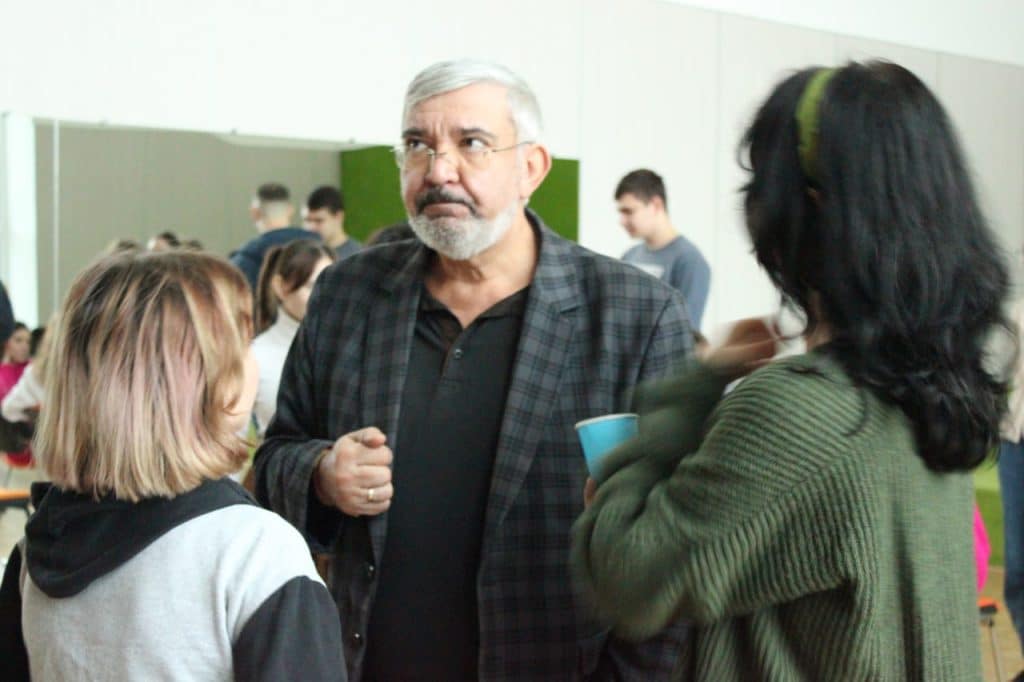
I began working with kids back in 2011. We have been working in the current format since 2018. Prior to that we had used a different approach – one speaker would come to a meeting with the class, answering their questions. We had held about 500 such meetings at different schools in Kyiv’.
We put special marks with different meanings opposite the name of each person whose name we wrote down. Speakers were offered plenty of opportunities to help with their feedback and participation. The easiest thing they can do is keep in touch with children on social networks, occasionally answering their questions or (like in my case) checking their essays and sending them my feedback. Speakers can also offer material help, for instance, by donating equipment, doing a tour at their workplace or supporting the kids financially, etc. You can also become a mentor for one or several students.
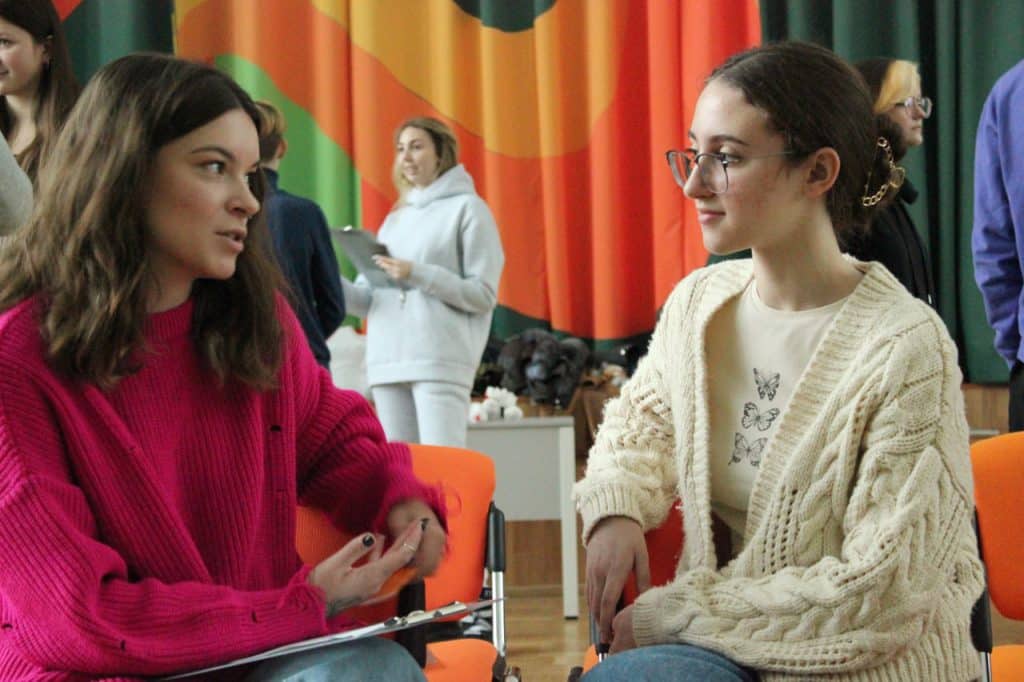
I remember Masha speaking so patiently about journalism, asking clever questions and beaming with pleasure after she received the book from me. The mark I put opposite her name meant that I was ready to become her mentor. This means that I have to devote my attention to her once a week by delivering lectures, giving her home tasks, taking her with me to interviews and coming up with ideas for her professional development. Andriy said that 90% of the speakers agree to be mentors.
A story worth one million (or 400 thousand)
Afterwards I had the chance to speak to Andriy Pushkar. He told me the story of Mira, who was selling knitted socks. Mira is the sole breadwinner in the family. She sells socks and gives all the proceeds to her parents who cannot work due to certain circumstances. Her mom occasionally works as a nanny. She is now in search of a job. First, Mira did not even have a cell phone. One of the speakers helped her with that. Today she came to the meeting with a laptop, thanks to which she is going to develop her skills.
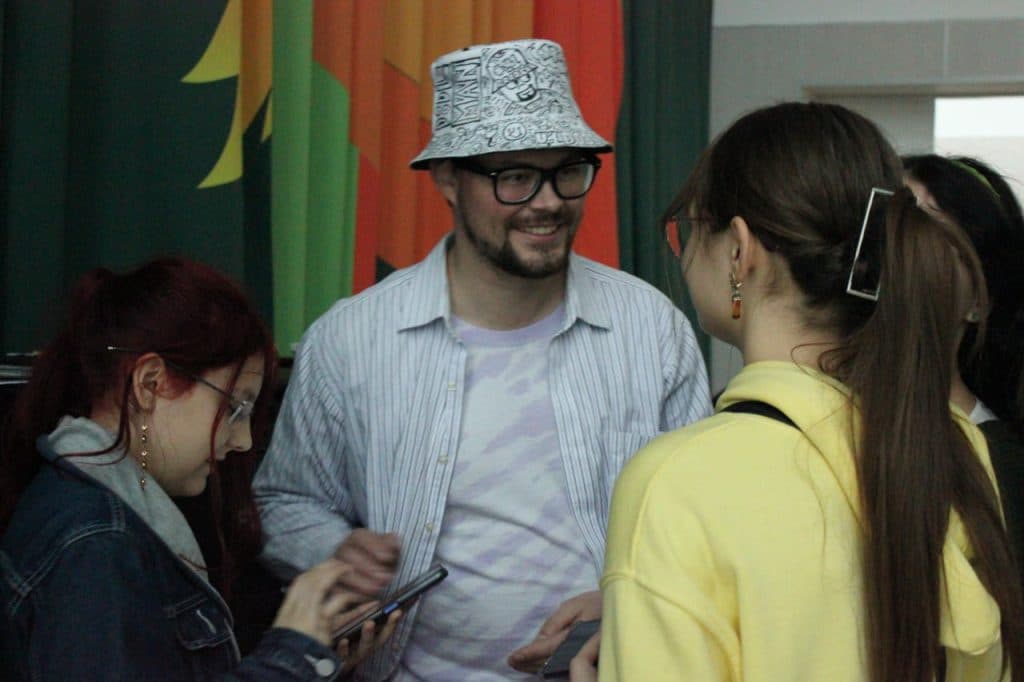
‚For now she does not know what she wants to do in life, but I already see that after she has grown up, I will invite her as a speaker to the School of Heroes to talk to children. She will become a cool sponsor of future generations. By teaching kids and helping them, we are automatically raising a new generation’, Andriy says.
There are plenty of such stories. Another one is about a girl who came here as a migrant. She visited the School of Heroes only once. She got lucky to meet the director of a private school at her very first meeting. He wrote to her later and she received a 300-thousand UAH (about 750 USD – translator’s note) scholarship for studying at the school. There is another story of a boy who wanted to produce unmanned aerial vehicles. He found an investor who provided him with two offices and 400 thousand UAH (about 1000 USD – translator’s note) and contacts of people from the brass of the Armed Forces of Ukraine. Now the boy says he does not have spare time to come to the meetings since he is busy with work.
‚I was doing some math recently. The kids raised 150 thousand UAH (approximately 3,750 USD – translator’s note) in the form of their salaries. Someone took phone calls while others delivered food or cleaned classrooms. They also received equipment worth about 100 thousand UAH (about 2,500 USD – translator’s note). The laptop that they got was not the first gift they received. Since last summer I have done 47 meetings. About 500 speakers have attended them at the School of Heroes. I tried to count just how much help the kids have managed to get in monetary terms. The total amount came out at 1,1 million UAH (27,5 thousand USD – translator’s note)’, Andriy says.
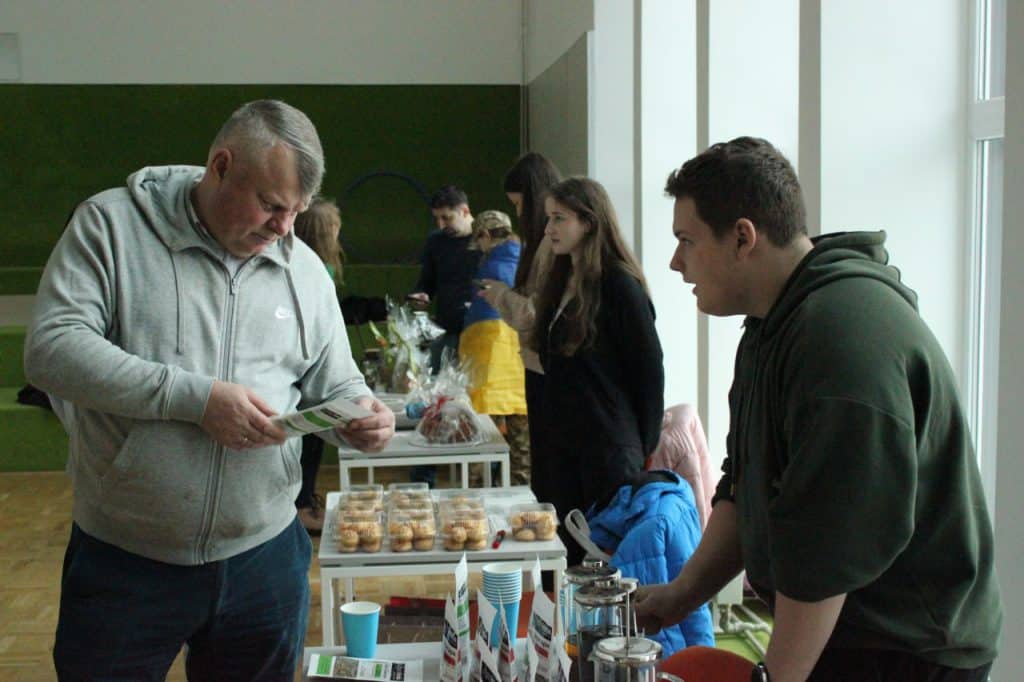
According to the founder of the School of Heroes, he is ready to admit any children to the project. However, as a rule, these are teens aged 14-16. The oldest participant was a 21-year-old girl who studied at the university. She attended two meetings and instantly landed a job. The youngest student was an 8-year-old boy. He wanted to create chatbots but he did not have a laptop. After 6 o 7 meetings he found a speaker who presented him with the needed equipment.
How can I help?
The School of Heroes can be supported by a one-time or regular donation that will be charged from your credit card every month. The project can also be supported by word of mouth since there is no budget for ads. On top of that, parents can send their children to the school. Attendance is free of charge. You can also become a speaker, since the school is inviting people from various fields. You can invite kids to a tour, offer them an internship, a session with a mentor or an opportunity to make extra money. You can also suggest your own way of help, for instance, you can offer premises for children to meet speakers weekly.

